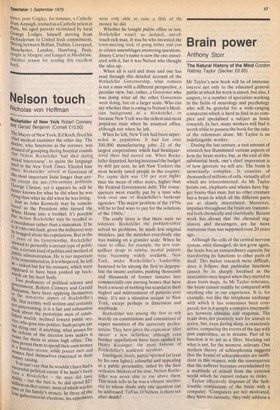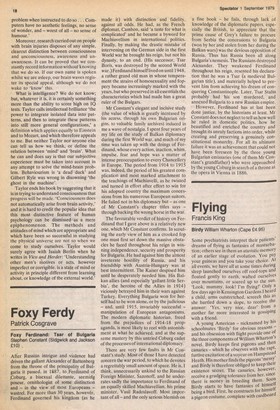Brain power
Anthony Storr
The Natural History of the Mind Gordon Raftray Taylor (Secker E6.95) Mr Taylor's new book will be of immense interest not only to the educated general public at which his work is aimed, but also, I suspect, to a number of specialists working in the fields of neurology and psychology who will be grateful for a wide-ranging conspectus which is hard to find in so complex and specialised a subject as brain research. In fact, many workers will find it worth while to possess the book for the sake of the references alone. Mr Taylor is an indefatigable worker.
During the last century, a vast amount of research has illuminated various aspects of how the brain works; but, at the end of this substantial book, one's chief impression is of how ignorant we still are. The brain is immensely complex. It consists of thousands of millions of cells, virtually all of which are interconnected. As Mr Taylor 'points out, elephants and whales have bigger brains than man; but no other creature has a brain in which all the different parts are so closely interrelated. Moreover, impulses throughout the brain are transmitted both chemically and electrically. Recent work has shown that the chemical regulators and messengers are .far more numerous than was supposed even 20 years ago.
Although the cells of the central nervous system, once damaged, do not grow again, the brain has an extraordinary capacity for transferring its functions to other parts of itself, This makes research more difficult, since it follows that particular functions cannot be as sharply localised as the anatomists once hoped when they started to draw brain maps. As Mr Taylor reiterates, the brain cannot readily be compared with anything else in our experience. It is, for example, not like the telephone exchange with which it has sometimes been compared; nor is it simply a complex intermediary between stimulus and response. The brain does not passively wait for stimuli to arrive, but, even during sleep, is ceaselessly active, comparing the events of the day with past experience, as in dreams. Part of its function is to act as a filter, blocking out what is not, for the moment, relevant. One modern theory of schizophrenia suggests that the brains of schizophrenics are inefficient in this respect, with the consequence that the sufferer becomes overwhelmed by a multitude of stimuli from the external world which he cannot reduce to order.
Taylor effectively disposes of the fashionable comparison of the brain with a computer. 'Computers are not motivated, they have no curiosity, they only address a problem when instructed to do so. . . Computers have no aesthetic feelings, no sense of wonder, and — worst of all — no sense of humour.'
Moreover, research carried out on people with brain injuries disposes of any simple, clearcut distinction between consciousness and unconsciousness, awareness and un awareness. It can be proved that we constantly record information without knowing that we do so. If our own name is spoken whilst we are asleep, our brain waves register its special appeal, although we do not wake to 'know' this.
What is intelligence? We do not know; but, whatever it is, it is certainly something more than the ability to score high on IQ tests. Taylor calls intellectual brilliance 'the power to integrate isolated data into patterns, and then to integrate these patterns into still more general configurations,' a definition which applies equally to Einstein and to Mozart, and which therefore appeals to me. But neither Taylor nor anyone else can tell us how we think, or define the relation between 'mind' and 'brain'. What he can and does say is that our subjective experience must be taken into account in any attempt to solve the mind-brain problem. Behaviourism is 'a dead duck' and Gilbert Ryle was wrong in disowning 'the ghost in the machine', Taylor ends his book by suggesting that it is in trying to understand consciousness that progress will be made. 'Consciousness does not automatically arise from brain activity,' and it is hard to credit the popular idea that this most distinctive feature of human psychology can be dismissed as a mere epiphenomenon. The methods and attitudes of mind which are appropriate and which have been so successful in studying the physical universe are not so when we come to study ourselves. Taylor would surely agree with Isaiah Berlin when he writes in Vico and Herder: 'Understanding other men's motives or acts, however imperfect or corrigible, is a state of mind or activity in principle different from learning about, or knowledge of tbe external world.'































 Previous page
Previous page